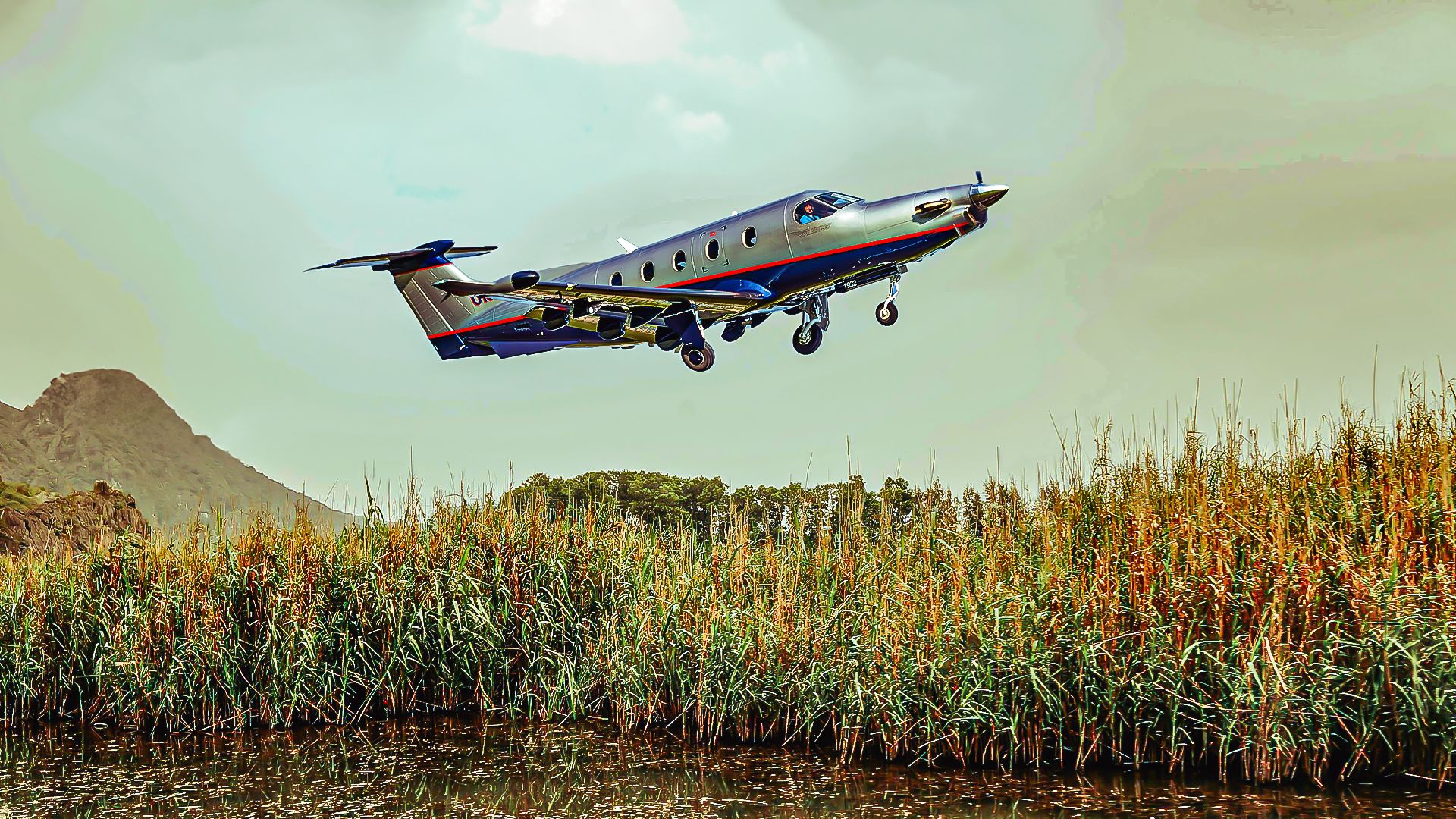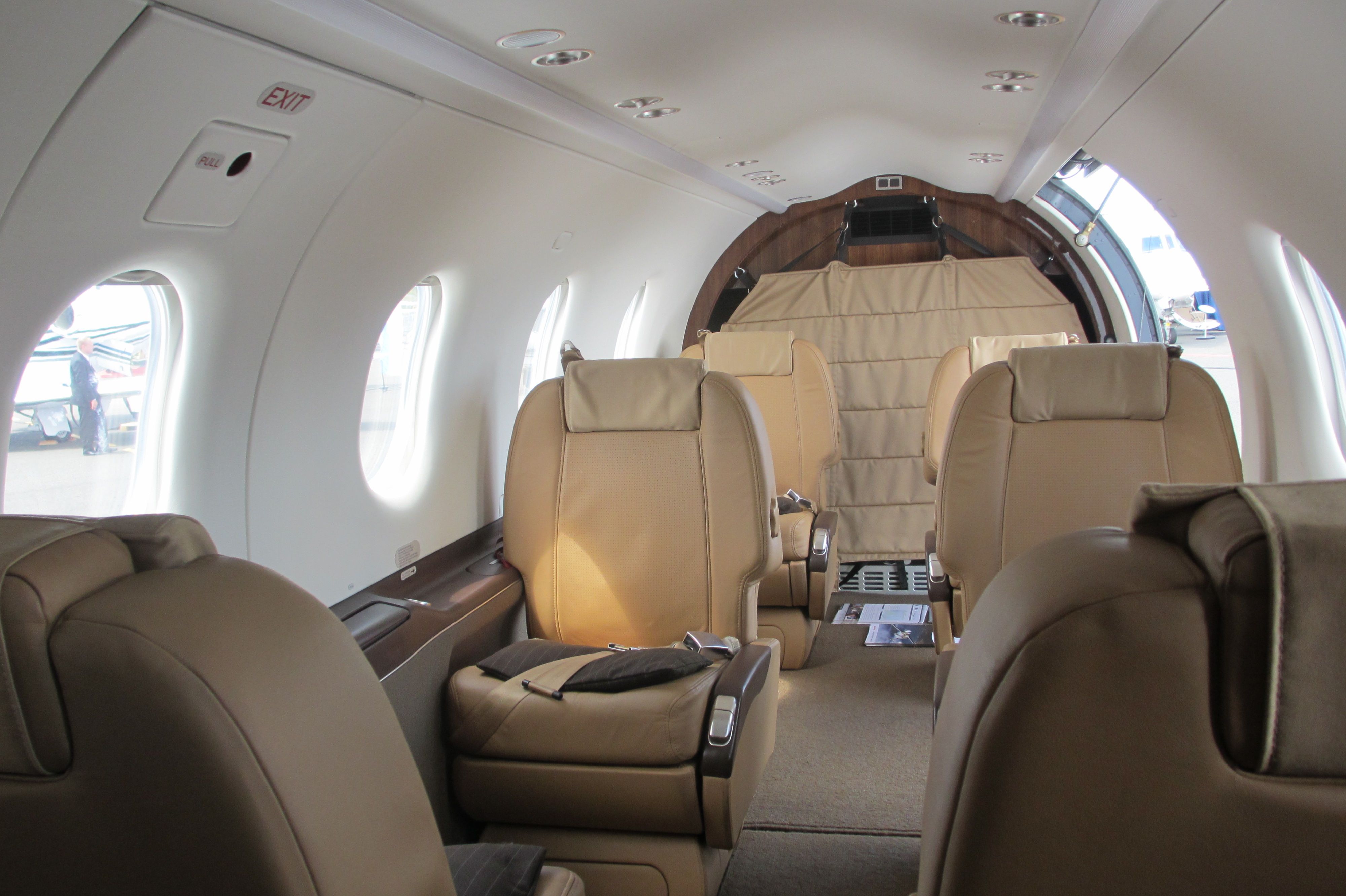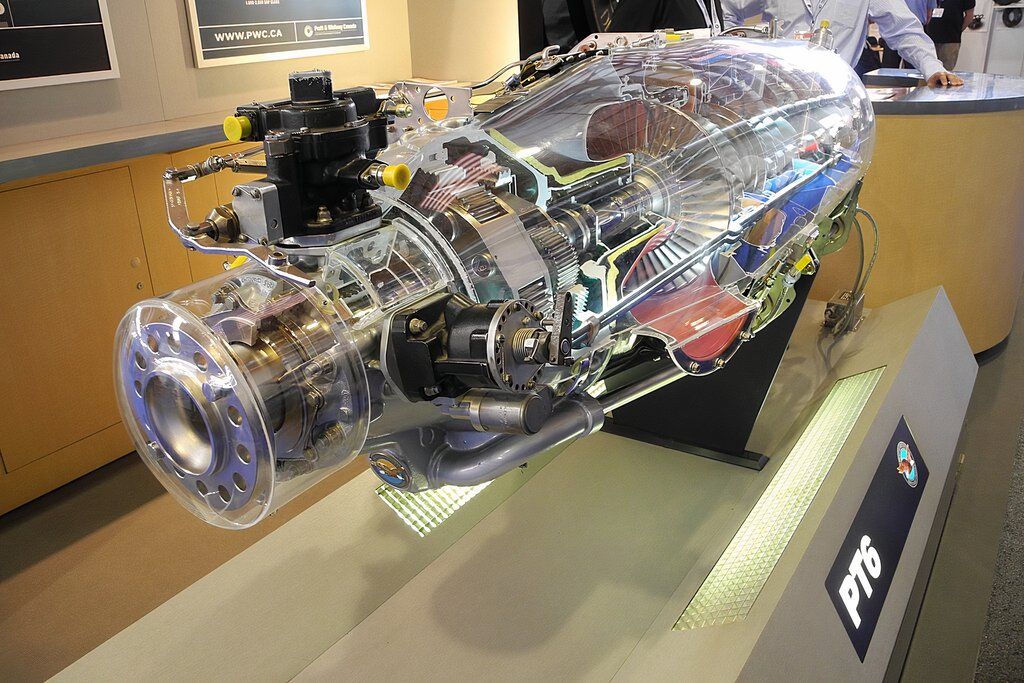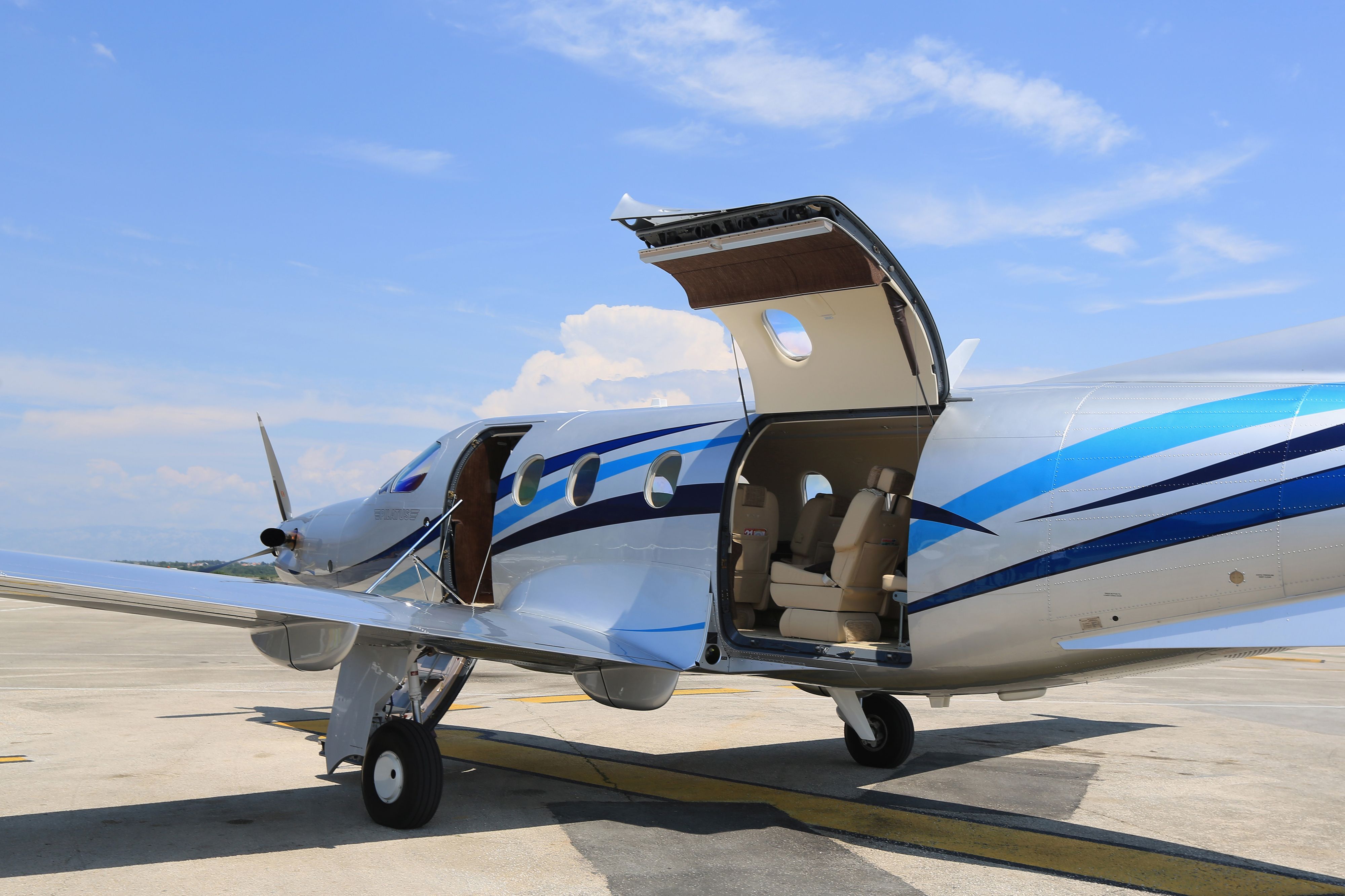Pilatus Aircraft is known for its innovative and quality products from Switzerland. Pilatus manufactures the PC-12, a popular choice for business and private flights. This single-engine turboprop boasts advanced features, including expanded windows and a luxurious cabin.
Pilatus PC-12
, a single-engine turboprop aircraft, is marketed as the “world’s greatest single” for luxury, high-performance utility. The propeller is a 5-bladed Hartzell. It is used worldwide for corporate transportation and various utility operations. Pilatus has produced 7 PC-12 variants, notable as the PC-12 NG and PC-12 NGX. The PC-12 is the best-selling Pilatus aircraft in its category, with over 2000 sold and over ten million fleet hours.
1
Comfortable Spacious Cabin
Its interior design makes it a preferred choice for diverse operating conditions.
The Pilatus PC-12 is a single-pilot-operated aircraft with a maximum passenger capacity of 9, as 1 passenger will sit in the copilot’s seat. The interior has a spacious 330 ft³ (9.3 m³) area, accommodating enough luggage and extra cargo. The aircraft features a large cargo door and a fully enclosed private flushing lavatory.
BMW Designworks designed the modern cabin, offering a comfortable and stylish experience. It features a full recline, tall seatbacks, and enough seat headroom, with fine leather and custom hand-stitching. It also offers WiFi, a featured inflight entertainment system, and connectivity technologies.
Designworks focuses on premium mobility by designing comfortable, luxurious, and unforgettable travel experiences. It has access to a vast network of suppliers, making it an ideal design partner for airline brands. Its expertise includes embracing expectations and focusing on the journey.
2
Kind to the environment
The PC-12 emits up to 74 % less carbon than other leading business jets.
The PC-12 turboprop engine is a powerful and efficient option for business aviation. Its digital autothrottle system maintains desired airspeeds, making it the most prolific turboprop engine in the world. The engine is also Sustainable Aviation Fuel
(SAF) certified, allowing it to operate on blends up to 50%, a drop-in replacement for conventional JetA fuel.
SAF is made from various feedstocks and waste products and is expected to reach 65 % of all aviation fuel consumption by 2050. The PC-12’s advanced aerodynamic devices on its wingtips save fuel by increasing performance and reducing drag, allowing the aircraft to climb to fuel-efficient altitudes more quickly and boost range without increasing fuel consumption.
Sustainable aviation fuel is offered at a handful of airports around the world, and availability is expanding quickly. Several companies have published interactive maps that quickly point you to where Sustainable Aviation Fuel is available.
Pilatus adopts eco-conscious interior and exterior design. To reduce harmful chemicals, they use high-solid paints and water-based primers. They also use an advanced laser for precision and efficiency, vacuum-electric sanders, and electrostatic paint guns.
3
High-end Avionic Suite
An ideal choice for both experienced and unseasoned pilots
The Honeywell
avionics suite provides high-end business jet functionality for light to midsize business jets. It features a synthetic vision system, digital charts and maps, coupled vertical navigation, and graphical flight planning for safety and situational awareness. The system includes an integrated primary flight display, interactive navigation, and a dual Flight Management System (FMS).
The Advanced Cockpit Environment (ACE) supports steep approaches, Cursor Control Devices, wireless apps, traffic information displays, and smart landing. The smooth-flying autopilot is based on airline transport technology that automatically optimizes and performs an optimized 3-dimensional flight path.
4
Low operating costs
Operating costs are 30 to 60 % lower than twin-engine jets and turboprops.
The fuel consumption for the aircraft is based on 69 gallons (261 liters) per hour on 300 nautical miles (345 m, 556 km) trip segments. Maintenance labor is calculated at 0.93 work hours per flight hour at a labor rate of $126 per person an hour, including routine scheduled, unscheduled, and on-condition maintenance.
Photo: Nadezda Murmakova | Shutterstock
Maintenance includes minor engine consumable parts required for routine, unscheduled, and on-condition maintenance. Propulsion overhaul costs $6 per flight hour, including the cost of any life-limited parts. Major periodic maintenance costs $94 per flight hour for components requiring major inspections or overhauls at regular intervals.
The Pratt & Whitney
E-Series Eagle Service Plan Platinum delivers a full-coverage service program. Engine restoration costs $173.15 per flight hour. Due to extended maintenance intervals, the aircraft has a reduced hourly direct operating cost. Its outstanding safety record has proven to have over 10 million flight hours.
The aircraft has a higher resale value due to its operating efficiency and attractiveness to buyers, leading to increased demand. An outstanding safety record has proven over ten million flight hours. Operating costs assume the aircraft is out of warranty, but labor and parts expenses will be lower while under warranty.
5
Exceptional Performance
“These impressive results will provide the basis for a promising, successful, sustainable future.” Markus Bucher, CEO of Pilatus
The PC-12 is a versatile business and utility aircraft that can handle various missions, including executive transport, cargo, air ambulance, and special mission applications. It combines the slow-speed capability of a Cessna 210 with the payload and high speed of a B-200 King Air. It features a dual-channel autothrottle with an electronic propeller, engine control system, and state-of-the-art integrated avionics.
It is certified for flight into known icing conditions. Upon landing, over 100 engine parameters are continuously monitored and recorded. The aircraft has a landing gear for unpaved field operations. Designed with Swiss quality, the PC-12 NGX performs well under international standard atmospheric conditions, with take-off and landing distances over fifty feet (fifteen meters) obstacles.
|
Maximum Cruise Speed |
290 knots (333 mph, 537 kmph) |
|---|---|
|
Maximum Takeoff Weight |
10,450 lb (4,740 kg) |
|
Maximum Landing Weight |
9,921 lb (4,500 kg) |
|
Take-Off Distance |
2,485 ft (757 meters) |
|
Range |
1803 NM (2075 m, 3339 km) |
The US Customs and Border Protection, Air and Marine Operations (AMO) uses the Pilatus PC-12. American high-profile individuals constantly fly in Pilatus aircraft, such as former US President George W. Bush, who relies on a PC-12 to and from his ranch in Crawford, Texas. Adam Carroll, President of a US consumer technology company, utilizes a PC-12 NG. The Shark Tank star Mark Cuban has also been known to fly on the PC-12.
The Pilatus market has seen a steady increase in airplanes for sale, with a 200% increase in inventory and a 5% decrease in price. The company has nine dealers in North and South America and a network of satellite service centers for maintenance. The PC-12 has a healthy aftermarket, with aircraft trading in the $2 million-$5 million range, and demand in the used market has spiked in recent years.



